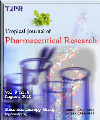
|
Tropical Journal of Pharmaceutical Research
Pharmacotherapy Group, Faculty of Pharmacy, University of Benin, Benin City, Nigeria
ISSN: 1596-5996
EISSN: 1596-5996
Vol. 16, No. 4, 2017, pp. 787-793
|
 Bioline Code: pr17100
Bioline Code: pr17100
Full paper language: English
Document type: Research Article
Document available free of charge
|
|
|
Tropical Journal of Pharmaceutical Research, Vol. 16, No. 4, 2017, pp. 787-793
| en |
Sevoflurane anesthesia induces apoptosis and cell cycle arrest in NPC-039 nasopharyngeal cells
Zhang, Yan & Lin, Hong
Abstract
Purpose: To determine the effects of sevoflurane on NPC-039 nasopharyngeal carcinoma cells.
Methods: WST-8 assays and flow cytometry with annexin V/PI staining were used to analyze the
effects of sevoflurane on growth and induction of apoptotic changes in NPC-039 cells. Cell viability was
performed on a microplate reader.
Results: Treatment of NPC-039 cells with 4 – 10 μM sevoflurane significantly inhibited cell growth (p <
0.005) with a median inhibitory concentration of 6 μM. NPC-039 cells incubated with sevoflurane
showed prominent nuclear fragmentation and chromatin condensation. NPC-039 cells that exhibited
apoptotic symptoms increased from 23.34 to 56.77 % when duration of treatment was increased from
24 to 48 h. Sevoflurane-treated cells also expressed increased levels of Bax and cleaved caspase-3.
Reactive oxygen species formation was also higher in sevoflurane-treated NPC-039 cells than in
control. Pre-treatment with Z-VAD-FMK followed by incubation with sevoflurane partly reduced the
population of apoptotic NPC-039 cells compared with cells treated with sevoflurane alone. The
proportion of cells in S- and G0/G1 phases decreased and increased, respectively, when sevoflurane
concentration was increased from 2 to 10 μM. Incubating NPC-039 cells with sevoflurane also markedly
reduced levels of cyclin-dependent kinases including p15 INK4B, cyclin D1, p16 INK4A, and CDK-6. In
contrast, pretreatment with ZVAD-FMK followed by incubation with sevoflurane increased p15 INK4B
levels.
Conclusion: Sevoflurane inhibits nasopharyngeal carcinoma cell growth, activating apoptosis and
inducing cell cycle arrest, thus suggesting its therapeutic potential for the treatment of nasopharyngeal
carcinoma.
Keywords
Sevoflurane, Nasopharyngeal carcinoma, Chromatin, Condensation
|
| |
© Copyright 2017 - Pharmacotherapy Group, Faculty of Pharmacy, University of Benin, Benin City, 300001 Nigeria.
Alternative site location: http://www.tjpr.org
|
|
